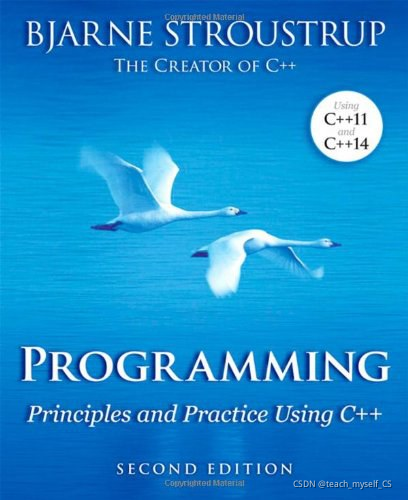本文主要是介绍[翻译]《Programming - Principles and Practice Using C++, Second Edition》- Preface,希望对大家解决编程问题提供一定的参考价值,需要的开发者们随着小编来一起学习吧!
本文导航(全文7500字左右,按正常阅读速度,大概需要15-25分钟)
- Preface 序言正文
- A note to students 写给学生
- A note to teacher 写给教师
- ISO standard C++ ISO的C++标准
- Support 学习支持
- Acknowledgments 致谢名单

Preface 序言正文
Damn the torpedoes! 1 去他妈的鱼雷!
Full speed ahead. 给我全速前进!
——Admiral Farragut 2 海军上将法拉格特
Programming is the art of expressing solutions to problems so that a computer can execute those solutions.
编程是一种艺术,它表达出问题的解法,从而让计算机可以执行那些解法(得到问题的答案)。
Much of the effort in programming is spent finding and refining solutions.
编程时,大部分精力都花在寻找和改进解法上。
Often, a problem is only fully understood through the process of programming a solution for it.
通常情况下,只有过一遍求解过程才能让你完全理解这个问题。
This book is for someone who has never programmed before but is willing to work hard to learn.
这本书是为了那些从未编过程,但下决心要努力学习编程的人而写的。
It helps you understand the principles and acquire the practical skills of programming using the C++ programming language.
它会帮助你使用C++编程语言来理解编程原理和掌握实用技巧。
My aim is for you to gain sufficient knowledge and experience to perform simple useful programming tasks using the best up-to-date techniques.
我的目标就是让你获取到充足的知识和经验,使用最好最新的技术来完成一些简单有用的编程任务。
How long will that take?
需要花费多长时间呢?
As part of a first-year university course, you can work through this book in a semester (assuming that you have a workload of four courses of average difficulty).
作为一门大一课程,你可以在一个学期内完成这本书的学习(假设你同时在上一般难度的四门课程)
If you work by yourself, don’t expect to spend less time than that (maybe 15 hours a week for 14 weeks).
如果你是自学,那么请不要妄想用少于14周,每周15小时 3 就把这本书学完。
Three months may seem a long time, but there’s a lot to learn and you’ll be writing your first simple programs after about an hour.
三个月看起来很长,但实际上你要学很多东西,(不要着急)因为学一个小时你就能写出第一个简单的程序了。
Also, all learning is gradual: each chapter introduces new useful concepts and illustrates them with examples inspired by real-world uses.
当然了,学习是一个循序渐进的过程:每一章都会介绍有用的新概念,并辅以实际生活中的运用示例。
Your ability to express ideas in code — getting a computer to do what you want it to do — gradually and steadily increases as you go along.
你通过代码表达思维的能力——也就是让计算机做你想做的事的能力——会随着学习的过程逐渐提升并巩固。
I never say, “Learn a month’s worth of theory and then see if you can use it.”
我从不会说(我从不相信),学一个月理论然后看看你会不会直接用。
Why would you want to program?
为什么要学编程?
Our civilization runs on software.
人类文明运行在软件上。
Without understanding software you are reduced to believing in “magic” and will be locked out of many of the most interesting, profitable, and socially useful technical fields of work.
如果不理解软件那就只能选择相信计算机中存在某种「魔法」并被一些最有趣,最高效,对社会最有用的一些工作领域拒之门外。
When I talk about programming, I think of the whole spectrum of computer programs from personal computer applications with GUIs (graphical user interfaces), through engineering calculations and embedded systems control applications (such as digital cameras, cars, and cell phones), to text manipulation applications as found in many humanities and business applications.
我说的编程是一个宽泛的概念,包括个人电脑上有图形用户界面的计算机程序、工程计算、嵌入式系统中的控制应用(比如数码相机,汽车和手机)、还有很多在人文社科、商业场景可见到的文本编辑程序。
Like mathematics, programming — when done well — is a valuable intellectual exercise that
sharpens our ability to think.
就像数学一样,编程——如果认真琢磨——是一个能锻炼思维的非常有价值的智力活动。
However, thanks to feedback from the computer, programming is more concrete than most forms of math, and therefore accessible to more people.
然而,多亏了计算机返回的反馈信息,让编程比数学更
这篇关于[翻译]《Programming - Principles and Practice Using C++, Second Edition》- Preface的文章就介绍到这儿,希望我们推荐的文章对编程师们有所帮助!




